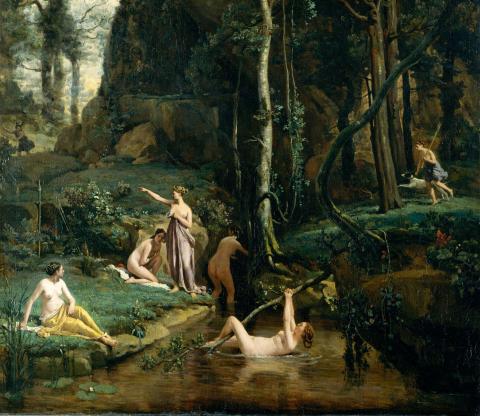Wei Zhang
October 23, 2017
Ovid’s Metamorphoses has fared better than other Latin epic poems in modern Chinese reception. It has been rendered into Chinese twice: first, selected parts (about three-fifths) were translated in the 1950s by the renowned scholar of English literature, Yang Zhouhan (1915–1989), who supplemented the rest and published the complete translation in 1984; second, a Taiwanese man of letters, Lü Jianzhong, published a version of the entire epic in 2008. Each translation has its own merits: Yang’s version reads fluently and his style is natural, with tinges of archaic feeling, aimed at easy and pleasant reading. Lü’s version is more colorful and playful, more elegant in its choice of words and expressions. Both translators used F.J. Miller’s Loeb edition as the basic text, consulting the facing English translation and whatever other English versions each could get hold of. More importantly, both (like Miller) opted for prose, though neither explains this decision in the translator’s preface. Yang seems to take it for granted that prose was the only option for the Chinese version. Lü is concerned with the average reader in our age, who is not accustomed to reading long poems; yet he emphasizes his willingness to sacrifice easy readability on occasion to imitate the rhetorical effects of the original.
How could a new Chinese translation improve on these extremely readable versions, and at the same time help us learn something new about Ovid’s work? The obvious solution is to attempt a poetic version. But, here arises immediately the difficult problem of poetic form. Both Yang and Lü apparently believe that, since there is no equivalent to the Latin epic meter in the Chinese poetic tradition, it is better to opt for prose, which at least is capable of re-telling the story faithfully. This point is made clear in the preface of Yang’s prose translation of the Aeneid and reflects a widely held belief among modern Chinese translators of western classical poetry. The prime example in this case is again, Homer. A debate over whether and how to render the Homeric epics into Chinese poetry has been going on for a century, yet there is no sign of reaching any agreement. Overall, those who argue that “the story” of the epics is the most essential part to be “translated” have carried the day. One sign of this “story-teller” view is the fact that the titles of all the epics mentioned above have been rendered into Chinese ending with the character ji—the Iliad becomes in Chinese “Ilion-ji”, the Odyssey “Odysseus-ji”, the Aeneid “Aeneas-ji” and the Metamorphoses “transformation-ji”. This character ji designates an age-old genre in traditional Chinese historiography, a narrative in prose of the biographical events of a person, or the historical events of a dynasty, and has also served as a model for the Chinese novel.
However, no serious reader of classical poetry (whether western or Chinese) can hold onto the belief that the poetic form is simply there to convey the “story” and therefore subordinate to it. A serious reader is aware that the form of a poetic work is inextricably linked to its poetic qualities and contributes to its distinct poetic style. [pullquote]When this serious reader imposes on himself the task of a translator, he must constantly ask himself: what are the foremost poetic qualities a poet endeavors to embody in his work, such as Ovid in the Metamorphoses?[/pullquote] To answer this question in the simplest way, three outstanding features have been agreed upon by commentators: rapidity, grandeur, and wit. All three features turn on Ovid’s extremely artful handling of the poetic form in terms of verses and words. It has long been seen that the rhythm of the hexameters in the Metamorphoses are more dactylic than Virgil’s. Other characteristics of these verses (e.g., elisions and caesurae) also come into contrast with Ovid’s chief rival poet, pointing to the conclusion that Ovid deliberately favors speed and lightness over Virgil’s weight and monumental gravity. Moreover, Ovid’s epic grandeur and wit are built on a verbal art that is almost matchless. In his poetic diction there is a profusion of Greek proper names and their adjectival derivatives, obscure mythological patronymics and periphrases, all combined to produce an epic grandeur of a very distinct type. In terms of his verbal wit, he uses etymological wordplay, pun, play between literal and figurative meanings of words and expressions, unusual word order, oxymoron, near-repetition (the list can go on endlessly to include almost all the rhetorical figures) all of which evoke an ironic effect that makes the reader ponder almost every line.
These poetic qualities are well appreciated by the serious reader, and pose a titillating challenge to the present translator. For me the attempt to “re-create” these qualities in a proper poetic form is a rare opportunity to experiment with the limits and niceties of the expressiveness of the Chinese language. Admittedly, there is no equivalent to the hexameter form in traditional Chinese verse, but prose, especially ji-prose of the historiographical or novelistic type, is simply not the right choice. One must create something like a “blank verse” to accommodate Ovid’s swift and flowing narrative, a “blank verse” without (obligatory) rhyme, and therefore free enough to “re-create” as much as possible Ovid’s poetic qualities. For, what a translator can learn from Ovid consists for the most part in the poet’s verbal art, in the metamorphoses not only of bodies but also of words. In this sense the translator reenacts the poet’s transformative act with his translation of the Metamorphoses into Chinese.
So let us begin at the beginning:
我要叙说各种形体如何变化一新
众神啊——变形正是你们一手造就——
开端伊始,请吹送灵感,从万物之初
引导我的诗歌,绵绵不绝,直至当下。
海洋、陆地和覆盖一切的苍穹形成以前, 5
寰宇之内,大自然的面貌到处如一
他们名之曰“混沌”——浑朴未分的大块
只是无生命的质料,其中聚集
万物的种子,但杂乱无章、尚未结合
那时还没有太阳的光芒照亮世界, 10
也没有新月让她的月牙渐渐盈满
大地未曾悬浮在周遭的空气里,
以自身的重量保持平稳,海洋也未曾
伸展臂弯,将大地绵长的边缘搂抱。
尽管那时有了陆地、海洋以及空气, 15
陆地尚不稳固,海水尚无法泳渡,
空气昏暗不明。没有元素保持形状,
元素与元素相互阻挠,在一体之内,
冷的与热的争斗,湿的与干的冲突,
硬的与软的、轻的与重的相互搏击。 20
(Header image: Detail from "Diana and Actaeon (Diana Surprised in Her Bath)." Camille Corot, 1836. Metropolitan Museum of Art 1975.1.162. Licensed under CC0 1.0. Public Domain.)
Authors


